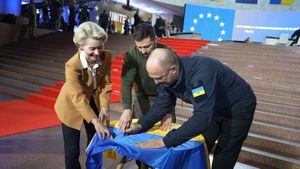The Catholic Church in Tenerife has welcomed Eloy Alberto Santiago as its new bishop, officially announced by the Spanish Episcopal Conference after the papal appointment by Pope Francis. Santiago, who previously served as the chancellor of the Diocese of the Canaries, will assume his new responsibilities on May 1 during a ceremony at the Cathedral of La Laguna. The Diocese of San Cristóbal de La Laguna has been without leadership since the resignation of Bernardo Álvarez on September 16, 2024, due to health issues.
Born on September 8, 1973, Santiago hails from Las Palmas de Gran Canaria, having entered the diocesan seminary of Canary Islands back in 1992 where he studied theology and was eventually ordained as a priest on July 17, 1999. His academic pursuits continued with degrees from prestigious institutions including the Pontifical Gregorian University, where he obtained his doctorate and canon law degree.
Before his recent appointment, Santiago held various roles within the church, including serving as a parish priest and engaging in diplomatic service for the Holy See across Colombia, Southern Africa, and Great Britain. His multifaceted background combines pastoral duties with diplomatic experience, which he views as beneficial for guiding the diocese through its current challenges.
Santiago's installation as bishop arrives at a time when the church faces significant social and pastoral hurdles. During his introductory press conference, he acknowledged the pressing issues of poverty, youth unemployment, and family distress. He stated, “I am aware of the social and pastoral challenges facing the Church today, embracing the immense task of living out and transmitting faith within our modern world.”
Addressing the difficulties, he emphasized the growing secularism and indifference prevalent within society. “We must combat the reality where many baptized individuals lack substantial engagement with their faith, alongside the troubling instances of abuse and the dwindling numbers of vocations,” he remarked. Santiago’s approach seeks to transform these challenges—often perceived as negative—into opportunities for revitalization and hope grounded in Christ.
Santiago reflected on receiving the news of his appointment as surprising and humbling, stating, “It certainly took me by surprise. While there is apprehension, I take this on with obedience and gratitude.” His commitment to serving reflects the lessons learned from his parents, who instilled the values of service and humility early on.
Expressing gratitude to Pope Francis for his trust, Santiago noted the significance of this role within the Church. “I feel called to serve, as I have always strived to do.” He positioned himself within the Diocese not only as bishop but as a collaborative figure, emphasizing unity among clergy and the faithful alike.
Looking forward, Santiago reaffirmed the church's mission to address human dignity and communal welfare, expressing intention to cooperate across different societal sectors. He recognized the existing conditions faced by migrants arriving at the islands and reaffirmed the church’s commitment to address these humanitarian issues, stating, “We will continue to fight coordinately to provide answers to this humanitarian crisis.”
Despite acknowledging the legacy of his predecessor, Santiago addressed the past comments made by Álvarez on homosexuality, describing them as “unfortunate” and expressing regret they overshadowed two decades of otherwise impactful service within the diocese.
His upcoming leadership on May 1 will not only mark the transition for the diocese but also signal continuity with the existing pastoral plans, albeit with some personal adjustments reflective of his own leadership style. The current administrator, Antonio Manuel Pérez Morales, who has overseen the diocese since Álvarez’s resignation, will assist Santiago during this transition.
Pérez shared insights about Santiago, emphasizing his amicable personality and wide-ranging institutional knowledge accumulated through years of service. He stated, “His diverse experiences, including his proficiency in several languages and attention to pastoral needs, are blessings for our diocese.” He anticipates some “discontinuous continuity” during Santiago's episcopacy, acknowledging unique regional challenges such as demographic changes and migration pressures.
Looking to the future, Santiago's proactive engagement with these issues will be key as he navigates the responsibilities of bishop. Pérez indicated there is still much to be understood about Santiago's definitive plans but expressed optimism for how Santiago's unique approach will breathe life back to the diocese’s mission.
On the potential visit of Pope Francis to the Canary Islands, Santiago conveyed hopefulness but acknowledged uncertainty due to the Pope's health and recent remarks about his wish to visit the region. Both Santiago and Pérez affirmed the community's eagerness for the Pope’s possible arrival, which could bring added attention and support to local initiatives.
With Eloy Alberto Santiago taking the helm, the Diocese of Tenerife appears poised to address its unique challenges with fresh insight and faith-driven determination. His operational blueprint focuses on building bridges rather than walls, enhancing collaboration within the community and beyond.



